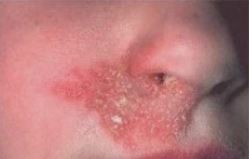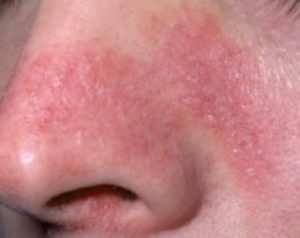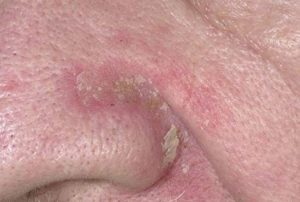Flaky, dry skin around nose can result from a variety of causes. Crease on skin can be as a result of the cosmetic and soaps you use. Naturally, the aging process can cause skin to become dry as the sebaceous glands become sluggish with age. Vitamin deficiency is a major cause of dry skin not only on nose but other body parts. Here are other causes and treatment options to get rid of dry skin.
Dry skin is quite common and can affect anyone regardless of age. Dry skin around the nose is common in winter and can be caused by taking too long steamy or hot showers. Dryness can also be due to different medical conditions. Psoriasis, rosacea, and eczema are common cause of dryness on face and nose. This article cover the other possible causes and how to treat and get rid of dryness.

Dry flaky skin around nose
Dry flaky skin around nose according to mayo clinic isn’t always serious. Dryness can, however, be uncomfortable and unsightly. A serious case of serious dryness is caused by an inherited condition known as ichthyosis. When left untreated, this condition could lead to disfiguring and can be very upsetting.
Most dry skin causes are environmental factors which can be partially controlled. Some of the common causes will include, Cold weathers, low humidity and soaking or showering in hot, or steamy water for long. Your skin is the first line of defense against these elements causing dry skin. Avoiding them is the best way to protect your skin against dry flaky skin.
Dryness can be on part of the nose or the entire nose. The dryness may also be accompanied by other symptoms such as itching, irritation and a burning sensation making it quite uncomfortable especially in children. Before attempting to treat dryness on the nose, you will first have to diagnose the symptoms to establish what the actual underlying cause of the dryness is.
Environmental cause is not the only possible cause of dryness around the nose. Dry and flaky nose can also be caused by other medical condition such as eczema also known as topical dermatitis, psoriasis. Flaky and dry nose or face can also be as a result of an allergic reaction to either food or medicine.
With dry skin that lasts for more than a week, you will need to seek immediate medical attention. You will also need to see a dermatologist when you notice the following symptoms:
- Red itchy bumps start to develop around nose and mouth
- Itchy and irritating sore around nose
- Painful bumps that start to discharge pus when popped
- Swelling and inflammation around nose
- Boil or abscess forming around nose
Red dry irritated skin around nose
On the face, the skin around the nose is quite sensitive. With a cold or constant blowing or wiping your nose. Red dry irritated skin around is a common sign of skin condition such as eczema also known as topical dermatitis, or psoriasis which is a chronic skin condition known to cause redness, itching and scaly patches on the skin.

Mild redness and irritation can be managed at home. If however, the irritation becomes bearable, you need to have the condition checked by a dermatologist. Understanding the underlying cause of dryness and irritation is the best way to treat the symptoms and prevent it from recurring in the future.
Dry skin around nose causes
Dry skin around the nose is common. Deepening on what the underlying cause of the dryness, some causes case of dryness may require treating whereas others do not, the dryness clears on its own within some time. Simple remedies can also be used in managing and controlling the symptoms of dry skin. Here are some possible causes of dryness on the face, around the nose and other body parts.
Dry skin around nose piercing
Body piercing is an old tradition. Piercing is common on ear lobe, tongue, and nose. This kind of activity is regarded by many as a form of beauty. Piercing can be painful and when the jewelry used become reactive to you skin, it could cause and infection leading to an even more irritating wound.
When the wound is exposed to harsh environmental conditions, you could develop a dry skin around nose. Using harsh cleansers might also lead to this kind of dryness. With a dry skin, you are more likely to observe some cracks. Urgent treatment is required, leaving it unchecked might lead to the wound becoming infected or spreading the infection to other parts of the body.
With piercing:
- it is important to have it done by a professional,
- Make sure the tool you are using are clean and sterilized.
- Avoid sharing this tools to reduce the risk of spread of infection such as HIV/AIDS,
- Avoid wearing the ring for long change it every once in a while
- You will also need to avoid touching the pierced nose with dirty hands to reduce the risk of infection
Dry skin around nose vitamin deficiency
Vitamin and mineral deficiency is the other possible cause of dryness around the nose. Not eating a balanced diet or having a weak or compromised immune system can be the reason you develop a dry facial skin. Deficiency in vitamin B6 can results in irritability in skin, the formation of red scaly and greasy skin around nose, eyes, and mouth.
Vitamin deficiency can also lead to the formation of acne like rash n forehead and crack on the corners of the mouth. Other symptoms such as scaly skin occurring around nose can be as a result of a deficiency in biotin, this is however very rare. Biotin is a vitamin of B complex, you can boost it by eating eggs, liver, and yeast. The function of this vitamin is the synthesis of fatty acid and glucose.
Seborrheic dermatitis
Also known as seborrheic eczema, seborrheic dermatitis is a chronic relapsing and usually a mild condition that results in inflammation of the skin. Most of the times, it is characterized by itching, red skin and an irritating rash. Some people may also develop blisters. In long term cases, seborrheic dermatitis may cause the skin to become thickened.
It is a common skin disorder that mainly affects the scalp. The condition can also occur on torso and face causing the dry skin around nose. On body parts rich in sebaceous gland, the condition is known to cause flaky, scaly, itchy and red skin.
The specific cause of this condition is not known. Weakened immune system and lack of specific nutrient are however believed to be associated with this condition. The condition can be controlled with a number of medications. This includes the use of antifungals, topical corticosteroids, and antihistamine medications.
Eczema around nose
Eczema is another inflammatory skin condition characterized by redness and itching. The condition is also referred to as atopic dermatitis and could be the cause of dry skin around the nose and on the face.
Contact dermatitis
Dry skin around nose can also be caused by contact dermatitis. Contact dermatitis is a red, itchy rash caused by an irritating substance that comes in contact with your skin. Dry skin or rash caused by contact dermatitis is neither contagious nor life-threatening.
Contact dermatitis around nose can be caused by soap, cosmetic and skin care products, and jewelry for those with pierced nose and plants. Treating dryness caused by contact dermatitis, you need to first identify and avoid the cause of the reaction.
Perioral dermatitis
Perioral dermatitis is a common cause of skin rash in young women. The rash is common on the mouth and nose and is triggered by the use of steroid creams on the face. If perioral is the cause of dryness around nose, then treatment will involve discontinuing the use of steroids. Antibiotic can also be used to reduce the dryness.
Other possible cause this condition might include:
- Skin cleanser and other cosmetic make-ups
- Yeast and bacterial infection around nose
- Hormonal factors especially during periods
- Use of contraceptives
Skin cancer
Itchy red patches around nose can also be a possible sign of skin cancer. Skin cancer is the common type of cancer. Skin cancer is the uncontrolled growth and division of abnormal skin cells. This occurs when unrepaired DNA damage to skin cell triggers mutation that leads to the multiplication of skin cells.
Psoriasis
Another skin condition marked with redness, itchy and scaly patches is psoriasis. It is a chronic autoimmune condition that causes a rapid buildup of skin cells. The buildup of skin cells is what causes scaling of the skin surface.
Inflammation and redness around the scales are also common. The patches may at time crack and bleed. The symptoms of this condition will vary from one person to the other. Common symptoms will, however, include the following:
- Raised and inflamed red patches on skin
- Painful swelling around nose
- Dry skin around nose that may bleed and crack
- Soreness around the red patches
- Itching and a burning sensation around nose
Other possible cause of dryness
Apart from the ones discussed above, dry skin around nose can also be caused by the following:
- Certain medication and cosmetic products especial for young females
- Exposure to harsh chemicals without proper protective clothing’s
- Exposure to sun and wind for long durations
- Dehydration caused by alcoholism
- Hormonal changes common in females especially during pregnancy, menstruation or after periods
- Allergies to either drug and foods can also cause some of these symptoms
Extremely dry skin around nose and mouth
Extremely dry skin around nose and mouth is a common symptom of psoriasis. Psoriasis is a chronic autoimmune condition. The symptoms of this condition will vary from one person to another. Psoriasis is not contagious meaning it is not possible to pass the condition from one person to the other.
Psoriasis can be triggered by stress, high alcohol consumption, face injuries, medication and infection due to weakened immune system.
Dry itchy skin around nose and eyebrows
Allergic cosmetic products such as foundation makeup can be the cause of dry itchy skin around nose. Mascara and threading of eyebrows can also cause irritation and itching. Other causes will include washing you face with harsh soaps or coming in contact with other irritating skin products.
Itchy and dryness can also be caused by eczema also known as atopic dermatitis. For mild cases of dryness and itchiness, both at home and medical treatment can be used. Seek medical attention if the itching or irritation last for more than a week. Treating the underlying cause of the dryness and itching is the best way to get rid of the dryness.
Painful dry skin around nose crease and chin
Perioral dermatitis can be the cause of painful dry skin around nose crease and chin. According to WebMD, perioral dermatitis is a facial rash that causes bumps to develop around the mouth, eyes, nose crease or forehead.

Perioral dermatitis can affect anybody, it is, however, common in young women. The exact cause of the condition is not known, the rash may, however, appear after applying topical steroid on the face. If your face starts to feel painful with dry skin around nose after using such creams, discontinue the use and seek medical attention.
Dry skin around nose treatment
The treatment and management of dry skin around nose will vary depending on what the underlying cause of the dryness is. Whereas some cause may be mild and clear on their own, some may be serious and call for emergency health measures, this will include cause such as skin cancer. For other condition, avoiding the underlying cause of irritation is enough to reduce and get rid of dryness.
Before attempting to treat dryness around nose, you need to have a dermatologist do some test to establish what the underlying cause of the infection is or what the extent of spread of the infection is. This way, you will be able to not only treat the condition but prevent it from recurring in the future. Your doctor is more likely to prescribe one or combination of the following to treat dry skin around nose.
Topical and oral antibiotics
Topical antibiotics will be used in case of mild bacterial infection. This is common among those who have pierced their nose thus resulting in an infection. If the infection has spread, however, then a dose of oral antibiotics will be prescribed. Topical and oral antibiotics can be used together.
Topical oral corticosteroids
Most case of dryness around nose can be solved using topical skin moisturizers. When the dryness fails to response to the use of moisturizer, then you dermatologist or health care practitioner will prescribe a topical corticosteroid. This ointment will help relieve the skin of itching and irritation and also bring down the inflammation.
This medicines may be reactive to the skin. When using them, discontinue the use immediately you notice some side effects, (especially oral corticosteroids)
- Clouding of the lens in one or both eyes
- Increased blood pressure
- Suppressed adrenal gland hormone production this can be shown by pain in muscles and darkened skin on face, neck and back of hands.
Antihistamine
To bring down skin inflammation, antihistamine medication may be used. This drugs can also act as anti-allergy medication.
Regular skin moisturizing
To prevent or reduce dryness, you need to regularly use moisturizers. These are gels and creams used to prevent skin dryness. Have a professional prescribe one for you to avoid worsening the dryness around the nose.
Exfoliation around nose and face
Exfoliation is the other way to keep your skin fresh and free from a bacterial and fungal infection that might cause the dryness. Exfoliation involves the removal of dead skin cells on the skin surface. It is a common process of facial, microdermabrasion and chemical peels at medical spas.
Antifungal creams
For yeast infection around nose or condition such as mouth, foot, and hands disease, antifungal creams may be used to bring down some of the symptoms.
How to get rid of dry skin around nose – remedy
Dryness around the nose is not harmful, as such it should not be a reason to worry or panic. Some of the symptoms accompanying the dryness can be managed and controlled at home using natural and simple home remedy. To offer relief for dry skin around the nose, here are some of the simple remedies you might use.
Drink plenty of water
A simple remedy and secret to healthy living is drinking plenty of fluids especially water. Remaining hydrated may help prevent a lot of skin conditions including dryness. When your water intake fails to equal your output, you become dehydrated. This is common in warm climates and strenuous exercise. Dehydration is, however, common in old people.
The benefits of drinking water will include:
- Helps maintain the balance of body fluids
- It is good for the skin as your body is always hydrated
- Water help control body calories
- Energize muscles
Mild soap and cold water
Using steamy showers and hot baths makes your skin dry by removing the oil on the skin. Stick to a mild soap and cold soap that will help maintain skin oil, this way, you are able to prevent your skin from drying
Olive oil
Olive oil can be used as a natural home remedy for dry skin. It contains anti-inflammatory and anti-itching property that can be used to relieve the itching and inflammation caused by dryness around the nose. For an even better remedy, you can use a combination of egg yolk and olive oil. To prepare the remedy:
- Mix an egg yolk with some amount of olive oil
- Gently stir the combination to mix
- Apply the resulting solution on the affected area around nose
- Leave the paste on for some minutes
- Rinse it off with cold water and dry with a clean towel
- Apply a mild skin moisturizer
Skin exfoliation
For dry skin, you can also have a natural skin exfoliation. To exfoliate naturally you can use honey, yogurt or sugar. Honey helps speed up the natural exfoliation process. It has humectant qualities that help attract moisture. That makes honey a great hydrating facial scrub.
To use yogurt, as an exfoliating agent, just apply a plain yogurt too face and leave it on for some minutes before rinsing it off. Repeat this twice daily for optimal results.
Sources and reference
- Common skin conditions: http://www.nhs.uk/Livewell/skin/Pages/Commonconditions.aspx
- Fighting back against dry skin: http://www.webmd.com/beauty/dry-skin-13/dry-skin-causes
- Dry skin overview: http://www.mayoclinic.org/diseases-conditions/dry-skin/home/ovc-20248889
- Causes of dry skin around nose: http://newsbeat.co.ke/dry-skin-around-nose-causes-get-rid-dry-nose-skin/
- Dry skin around nose: http://www.healtreatcure.org/dry-skin/dry-skin-on-nose-around-nostrils-mouth-crease-red-flaky-get-rid/
- Dry skin on nose treatment: http://www.healcure.org/skin/dry-skin/dry-skin-around-nose-causes-piercing-get-rid-of-itchy-red-flaky-very-dry-skin-remedies/
- Dry skin around nose: http://www.buzzle.com/articles/dry-skin-around-nose.html
